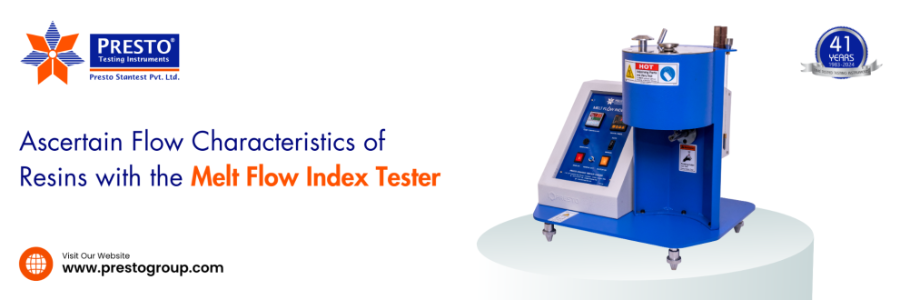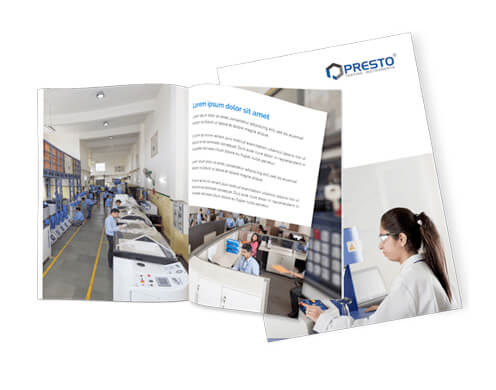What is the Specific Melt Flow Index Formula for Calculating MFI of the Materials?

The melt flow index (MFI) is a crucial parameter in the analysis and quality control of polymers, as it measures the ease with which a polymer melts and flows under specific conditions. This property of polymers can be tested with the help of a specialized instrument that accurately measures both the weight and volume of molten polymer that passes through a standardized capillary orifice within a given time frame. By obtaining precise melt flow index values, manufacturers can evaluate various properties such as viscosity, molecular weight distribution, processability, and potential applications of different polymers.
Presto is a Asia’s No.1 melt flow index tester manufacturer and designs different models of this quality testing equipment. The melt flow deluxe model is highly useful in plastic and polymer industry to determine the flow rate of different polymers.
In this article, we will focus on the specific MFI formula for calculating melt flow index of polymers. But first, let us focus on the principle of melt flow index testing.
Principle of Melt Flow Index Testing
The Melt Flow Index (MFI), also known as the Melt Flow Rate (MFR) is a widely used measurement in the plastics industry for evaluating the flow properties of thermoplastic materials. It is a test method that determines the rate at which molten plastic flows under a specified temperature and load. The results obtained from this test are often used to assess the processability, quality, and performance of raw materials and finished products.
The principle behind MFI testing is relatively simple - a known quantity of melted plastic is forced through a die under standard conditions and the resulting weight or volume is measured within a specific time frame. The result obtained is expressed as grams per 10 minutes (g/10 min).
You can easily conduct melt flow test on PVC granules. Furthermore, this information aids in formulating optimal processing conditions during manufacturing processes like extrusion or injection molding.
Ultimately, incorporating a melt flow index tester into polymer testing procedures enhances product consistency and reliability while enabling researchers to make informed decisions about material selection for diverse industrial applications.
To calculate the melt flow index of the polymers, manufacturers of Plastic and polymer industry can effectively make the use of below mentioned formula:
Flow rate = (600/t X weight of extrudate of polymers)
t = time of extrudate in seconds
melt flow rate = g/10 min.
With this melt flow index formula, manufacturers can easily and effectively conduct melt flow test on the materials and ensure that accurate products will be delivered to the customers. Presto Melt flow index tester plays an important role in polymer processing.
Now, let us focus on the steps to use melt flow index tester.
Easy to follow steps for using Presto MFI tester
The Presto Melt Flow Index Tester stands out as an advanced laboratory testing equipment designed for measuring the melt flow rate of thermoplastic polymers. The outcomes of tests performed using this instrument are widely trusted by global experts, attributed to its adherence to or even surpassing international standards.
Specifically, the Presto Melt Flow Index Tester aligns with ASTM D 1238-1992, IS 2267-1972, IS 2530-1963, and IS 10810-1984 test standards, ensuring the precision and dependability of test results. Additionally, this lab testing instrument is user-friendly, consistently delivering reliable outcomes. Consequently, the Presto Melt Flow Index Tester for thermoplastics is the favored choice among experts worldwide.
Here, we present a practical guide for effortlessly testing the melt flow properties of materials.
- Upon acquiring the Presto Melt Flow Index, it is essential to accurately level the machine before commencing the thermoplastics melt flow test.
- After precise leveling, initiate the machine by plugging the main socket into a 3-pin 15 amp socket.
- Configure the values and test duration timing on the digital timer, setting the configuration lock to zero.
- Adjust the input for the RTD PT-100 sensor. Activate or deactivate auto-tune as needed.
This Melt flow index testing process facilitates easy testing of melt flow properties for various materials using the Presto Melt Flow Index Tester. Maintenance of melt flow index tester is also easy to follow for user convenience.
Factors Affecting MFI and How to Adjust for Them
In the realm of plastics, understanding Melt Flow Index (MFI) is key as it offers valuable insights into a polymer's flow properties. However, several factors come into play that can influence MFI results. It's pivotal to grasp these factors and learn how to make adjustments to ensure the data obtained is both accurate and dependable.
1. Temperature:
As temperatures rise, the melt viscosity of polymers takes a dip, resulting in an uptick in MFI values. This correlation is crucial to acknowledge when interpreting MFI data. This means that if the testing temperature is not consistent, it can significantly impact the MFI results. To adjust for this factor, it is essential to maintain a constant temperature during testing by using a precision-controlled heating system.
2. Pressure:
Just like temperature, pressure also has a significant effect on MFI values. An increase in pressure leads to an increase in melt viscosity, resulting in lower MFI values. Therefore, it is crucial to ensure that the proper test pressure specified by ASTM D1238 or ISO 1133 standards is maintained during testing.
3. Sample Preparation:
The way a sample is prepared can also affect its MFI value. If there are any air bubbles or impurities present in the sample material, it can result in inconsistent flow and inaccurate MFI readings. Properly preparing samples by eliminating air bubbles and ensuring uniformity throughout the sample will help prevent this issue.
These are some of the important factors that needed to be taken care of while conducting melt flow index test on the materials. You can also read more on the significance of Melt flow index tester in plastic industry.
For additional information on the Melt flow index tester price, feel free to contact us via phone at +91 9210903903 or through email at info@prestogroup.com. We are readily available to promptly address any inquiries you may have concerning this product.
Author : -Gaurav Malhotra
Recent News
- Paper & Packaging Testing Instruments
- Paint, Plating & Coating Testing Instruments
- Plastic & Polymer Testing Instruments
- Environmental Testing Chambers
- PET & Preform Testing Instruments
- Color Measuring Testing Instruments
- View Entire Range Instruments

Catalogue 2023
Get information about new product launches, research, innovation and endeavors at Presto.
download Free CopyNeed more information
Connect with us for your business enquiries. Generally we respond within one or two working days.
send enquiriesContact Us
Quick quote
